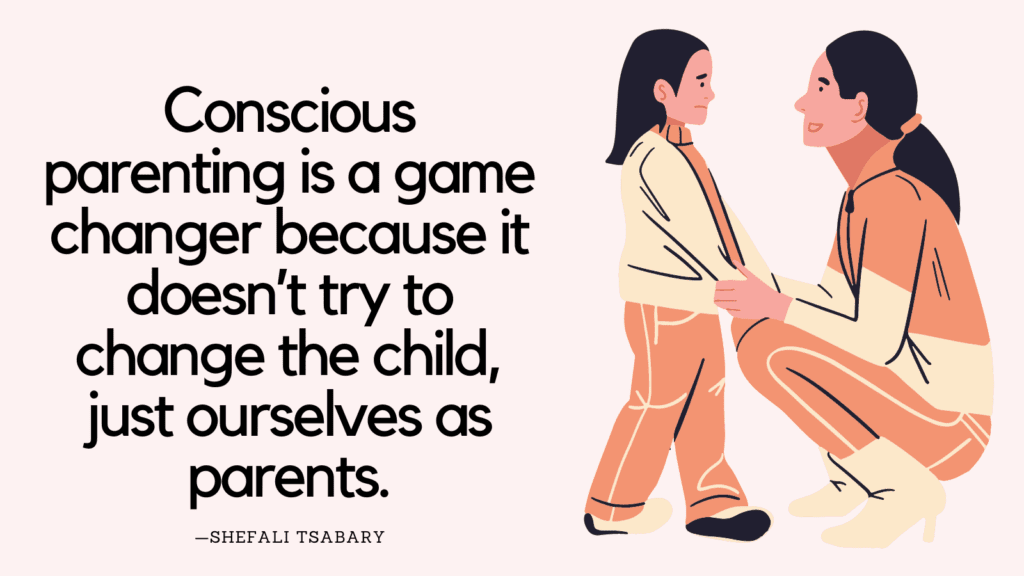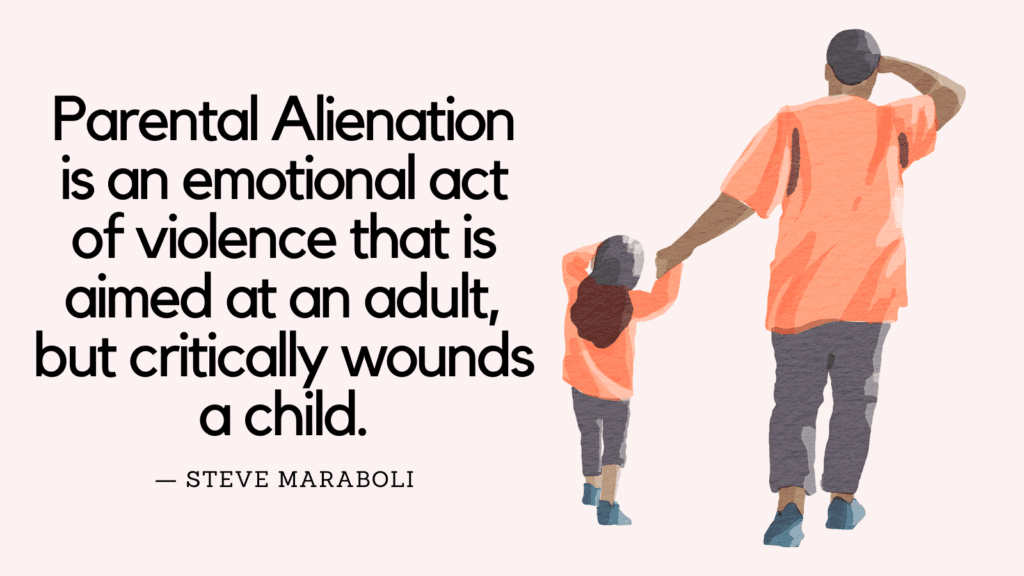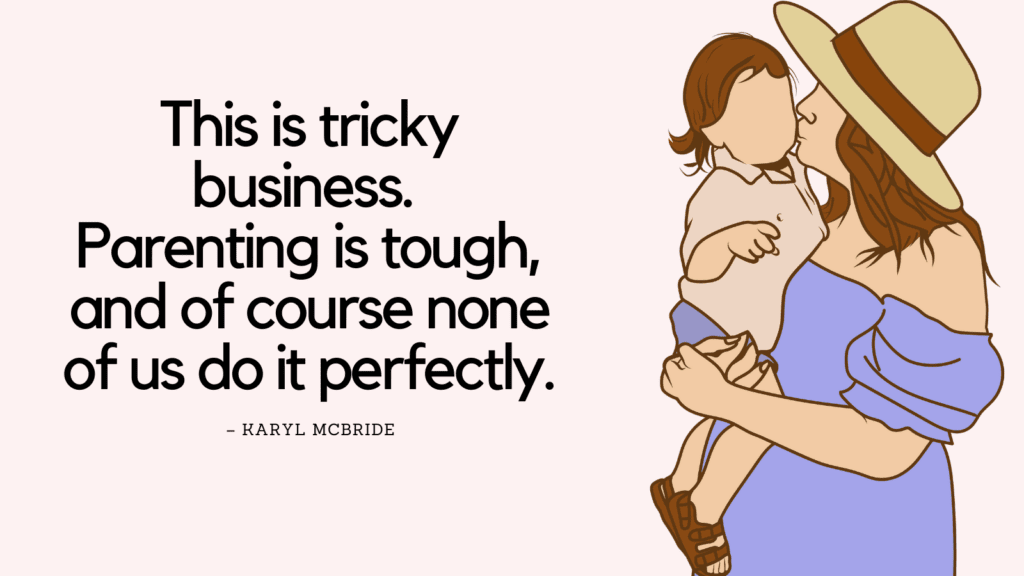This post contains some of the best conscious parenting quotes.
What Is Conscious Parenting?
Conscious parenting is an approach that emphasizes self-awareness and mindfulness in raising children.
It involves being present, attentive, and intentional in your interactions with your child.
Here are some key aspects of conscious parenting supported by research:
1. Self-reflection
Conscious parenting begins with self-reflection and exploring your own childhood experiences, beliefs, and patterns.
Understanding your triggers, biases, and unresolved issues can help you respond to your child in a more conscious and compassionate manner.
2. Mindful presence
Being present with your child means giving them your full attention, listening actively, and engaging in meaningful interactions.
It involves setting aside distractions and creating quality bonding time that fosters connection and understanding.
3. Emotional attunement
Recognizing and validating your child’s emotions is essential.
Conscious parents strive to create a safe space where children can express their feelings without judgment or dismissal.
Empathy and emotional support help children develop emotional intelligence and a strong sense of self.
4. Positive discipline
Conscious parenting encourages setting clear boundaries and expectations while promoting empathy and understanding.
Discipline is focused on teaching rather than punishment, emphasizing natural consequences and problem-solving skills.
5. Modeling healthy behavior
Children learn through observation, so conscious parents aim to model positive behavior, effective communication, and healthy coping strategies.
Demonstrating self-care, emotional regulation, and respectful relationships can have a profound impact on a child’s development.
6. Individuality and autonomy
Conscious parenting recognizes and respects the individuality of each child.
It encourages allowing children to explore their interests and make age-appropriate choices, fostering independence and self-confidence.
7. Continuous learning
Conscious parents acknowledge that parenting is an ongoing learning process.
They seek knowledge, stay open to new ideas, and adapt their approaches as their child grows and develops.
Conscious Parenting Quotes
1. “None of us likes to think of ourselves as unconscious. On the contrary, it’s a concept we tend to balk at. So defensive are many of us that, let someone say a word about our parenting style, and we are instantly triggered. However, when we begin to be aware, we redesign the dynamic we share with our children.”— Shefali Tsabary
2. “Our children pay a heavy price when we lack consciousness. Overindulged, over-medicated, and over-labeled, many of them are unhappy. This is because, coming from unconsciousness ourselves, we bequeath to them our own unresolved needs, unmet expectations, and frustrated dreams.”—Shefali Tsabary
3. “Without a conscious parent there can be no conscious parenting! A conscious parent is able to maintain a certain level of awareness in their daily life, even though for most people lapses are bound to happen from time to time.”— Eckhart Tolle
4. “Conscious parenting isn’t about being lovey-dovey and touchyfeely all the time. When we parent consciously, we don’t give our children a green light to behave inappropriately, and neither do we automatically place their needs ahead of ours. To allow our children to behave as if they were wild, without regard for how this affects those around them, is to raise little monsters. Teaching our children how to appropriately contain their authenticity and manage their emotions is essential.”— Shefali Tsabary
5. “Although we might not become entirely free of ego, to parent consciously requires us to become increasingly aware of the influence of our ego.”—Shefali Tsabary
Related: Autism In Women Symptoms That Are Often Overlooked
6. “So the reasons for dysfunctional or unconscious parenting are twofold. On the one hand, there is the lack of knowledge or education concerning child rearing that strikes a sane balance between the old, excessively authoritarian approach and the contemporary, equally unbalanced one. On the other hand, and at a more fundamental level, there is the lack of presence or conscious awareness on the part of the parents.”— Eckhart Tolle
7. “Consciousness isn’t a magical quality bestowed on the few who are lucky. Rather than being dropped out of the sky, it’s a state that emerges as part of a process.”—Shefali Tsabary
8. “There’s nothing “permissive” about parenting consciously.”—Shefali Tsabary
9. “”—Shefali Tsabary
10. “The conscious approach to discipline is grounded in our ability to exercise real presence with our children.”—Shefali Tsabary
11. “A conscious parent doesn’t look outside the parenting relationship for answers, but is confident the answers can be found for both parent and child within the parent-child dynamic.”—Shefali Tsabary
12. “The heart of conscious parenting is the ability to be present in any situation that arises. Are you able to respond from a place of awareness rather than attachment? Do you discipline from a place of authenticity or from your ego?”—Shefali Tsabary
Related: Shy Child Vs. Autism (& How To Parent A Child With Autism?)
13. “To be a conscious parent requires us to learn to respond to reality in a conscious manner rather than from blind impulse, using reason instead of reacting, and employing our active will in preference to coming from passive conditioning. It helps to realize that children, by their inherent nature, desire deep, lasting, authentic connection with us. If, then, our children have turned against or away from us, it means we haven’t met their emotional needs or taught them how to meet their own needs.”—Shefali Tsabary
14. “Conscious parenting encompasses all aspects of bringing up a child to be a well-rounded, balanced member of the human race.”—Shefali Tsabary
15. “Conscious parenting means that in our interactions with our children, we ask, “Am I dealing with my child in an aware manner or am I being triggered by my past?” The focus is always on us as parents, requiring us to look within and ask, “What am I bringing to this relationship in this moment that is mine to own and not my child’s to receive?””—Shefali Tsabary
16. “Becoming a conscious parent requires us to recognize how our unconsciousness, bequeathed to us by the collective unconsciousness, cripples our children.”—Shefali Tsabary
17. “If we are a conscious parent, we are patient and therefore in no hurry to impose every activity and piece of knowledge on our child. We recognize that childhood isn’t the time for the fruit to come to fruition, but the time to plant seed.”—Shefali Tsabary
18. “Since to give our complete presence is all that’s required to raise an emotionally healthy child, some parents might think this means they should be with their children almost all the time. On the contrary, a conscious parent may be extremely busy, and our children need to respect this.”—Shefali Tsabary
Related: How To Help A Child With ADHD Focus Without Medication? Best 21 ADHD Self-Help Techniques
19. “The premise behind conscious parenting is that our children are inherently well-meaning and want to do the right thing. However, in the course of a day, it’s inevitable a child will make a few mistakes either through omission or commission. If they are afraid of punishment, as already noted, they may then try to cover up their mistakes by lying.”—Shefali Tsabary
20. “The key to conscious parenting is to become aware of our ego, this persistent voice in our head, and its false ways. To parent well, it is imperative that we realize the ego isn’t who we are. Then, as we learn to identify its voice and its antics, we won’t blindly react to our children, which is what the ego wants us to do.”—Shefali Tsabary
21. “As much as conscious parenting is about listening to our children, honoring their essence, and being fully present with them, it’s also about boundaries and discipline. As parents, we are required to provide our children not only with the basics of shelter, food, and education, but also to teach them the value of structure, appropriate containment of their emotions, and such skills as reality testing.”—Shefali Tsabary
Related: How to NOT Raise a Narcissist? 7 Surefire Ways to Prevent Narcissism In A Child
22. “One of the typical reactions of parents who start on this path of conscious parenting is to look back at their errors and feel a sense of regret and guilt. I remind parents that this reaction, while understandable, is yet another ruse of the ego to create emotional paralysis and a disconnection from the present moment.” —Shefali Tsabary
23. “Because conscious parenting is concerned with the actual roots of our acting out—and I do mean our acting out as parents, not so much our children’s acting out—it avoids quick fixes and Band-Aids. Instead, we undergo transformation as moms and dads” —Shefali Tsabary
24. “Conscious parenting urges us to see our children’s reactions to us as a wake-up call to go within. Then, instead of acting out what we are feeling based on our past programming, thus taking it out on our children, we choose to contain our emotions and quietly reflect on what we are experiencing.” —Shefali Tsabary
25. “Conscious parenting is a game changer because it doesn’t try to change the child, just ourselves as parents.” —Shefali Tsabary
Related: How To Divorce Without Hurting Your Child?
26. “Adopting the conscious parenting philosophy can relieve your stress and improve your child’s self-image. The strong bond built between you and your child, along with your own calm, respectful attitude, will help her to develop positive behavior patterns.” – Erika V. Shearin Karres and Rebecca Branstetter, PhD
27. “Being a conscious parent can, in the end, help remove some of the burdens and obstacles that we face trying to raise kids in our modern world.” – Pedram Shojai and Nick Polizzi
28. “Being a conscious parent is all about building strong, sustainable bonds with your children through mindful living and awareness.” – Erika V. Shearin Karres and Rebecca Branstetter, PhD
29. “Being a conscious parent is not about trying to mold or change your daughter into your idea of how she should be (either in your mind or society’s image); it’s about creating conditions for your daughter to develop into the amazing individual she is meant to be, free from the binds of gender stereotypes.” – Erika V. Shearin Karres and Rebecca Branstetter, PhD
30. “Conscious parenting brings with it a number of benefits, including improved communication, stronger relationships, and the feeling of greater happiness and satisfaction in life. Some of these benefits appear more immediately, while others take some time to emerge.” – Erika V. Shearin Karres and Rebecca Branstetter, PhD
31. “Conscious parenting gives us the chance to dig deep to discover why we want to become parents, how we want to parent, and who we want to be as parents. Setting our parenting intentions can be one of the most powerful exercises we can do before our child arrives.” – Pedram Shojai and Nick Polizzi
32. “Conscious parenting is a process that is as unique and individual as each family. Parenting in a mindful manner requires an authentic appreciation for your gifts and talents (and those of your child), as well as an understanding of how best to employ those gifts and talents to help your child grow to be a happy, successful member of society.” – Erika V. Shearin Karres and Rebecca Branstetter, PhD
33. “Conscious parenting is about listening with full attention, and embracing a nonjudgmental acceptance of yourself and your child. As you engage in the act of becoming, you will discover a heightened sense of emotional awareness of yourself and your child, a clearer self-regulation in the parenting relationship, and a greater compassion for yourself and your child.” – Erika V. Shearin Karres and Rebecca Branstetter, PhD
34. “Conscious parenting is not a set of to-dos, a checklist to mark off, or hundreds of rules. Think of conscious parenting as a philosophy and a way of showing up and raising our children. It’s about becoming deeply aware in all situations and experiences so we respond mindfully, instead of impulsively, to our children. As the stewards of our children’s lives, it’s on us to nurture, develop, and help them grow into healthy adults who feel connected in their minds, bodies, hearts, and souls.” – Pedram Shojai and Nick Polizzi
35. “Conscious parenting is not some lofty ideal or goal to reach some day; it’s a way of life for you to embrace and continually work toward now. More than anything, conscious parenting takes your willingness to commit to waking up, becoming aware, and acting mindfully.” – Pedram Shojai and Nick Polizzi
36. “Conscious parenting isn’t a set of rules or regulations that you must follow, but rather it is a system of beliefs. Conscious parents engage and connect with their children, using mindful and positive discipline rather than punishment. They try to be present when they’re spending time with their children, avoiding distractions like TV and social media.” – Erika V. Shearin Karres and Rebecca Branstetter, PhD
37. “Conscious parenting requires us to be in a healthy relationship to our own childhoods and with parents too. No one escapes childhood without some experience that needs releasing and healing, and that may include our relationship with our parents. No one gets to choose everything that happens in our lives, especially when we are kids. But we do get to choose how we integrate those experiences, our understanding of them, and how they shape who we are as parents today.” – Pedram Shojai and Nick Polizzi
38. “Conscious parents do not try to mold their daughters into being a certain way, but rather set the stage for developing her strong self-image and self-confidence. By doing so, you are honoring her individuality and are less likely to have conflict and behavioral challenges arise.” – Erika V. Shearin Karres and Rebecca Branstetter, PhD
39. “Conscious parents respect their children and accept them as they are. The most important part of conscious parenting is building an emotional connection with your daughter so you can understand the underlying reasons for her behavior.” – Erika V. Shearin Karres and Rebecca Branstetter, PhD
40. “Conscious parents understand that all they do and say over the course of each day matters. It is a sense of the now, being in the present moment without regard or worry for the past or future. When you become more mindful, you may find that you become more accepting of the things in life that you can’t change and experience less stress. The net result is greater satisfaction and enjoyment of whatever each day has to offer.” – Erika V. Shearin Karres and Rebecca Branstetter, PhD
41. “Independence can fool parents into allowing their child to make choices without them, but the degree of a child’s success is directly connected to parents who are consciously involved in their growing teen’s life. Know what is happening in their lives without wanting to control every aspect. You will nd a balance between the independence your teen craves and the support and guidance they need.” – Bridget M. Spackman
42. “People fall into instinctual parenting patterns unless they bring more consciousness to how they parent, and then they have to have enough emotional independence to look at their kids and see what they need, what their ambitions are, what they are capable of, and who they are as unique spirits, and begin supporting that growth.” – Pedram Shojai and Nick Polizzi
43. “The awareness you gain as a conscious parent has the practical purpose of redefining your perception of yourself and your compassionate understanding of your child. When you understand how your child experiences the world and how she learns, you can communicate in ways that really reach her.” – Erika V. Shearin Karres and Rebecca Branstetter, PhD
44. “Traditional power-based parenting techniques that promote compliance and obedience can disconnect you from your children. Conscious parenting, on the other hand, helps you develop a positive emotional connection with your child. You acknowledge your child’s unique self and attempt to empathize with her way of viewing the world. Through empathetic understanding and tolerance you create a safe environment where your child feels her ideas and concerns are truly being heard.” – Erika V. Shearin Karres and Rebecca Branstetter, PhD
45. “When you find yourself in a stressful situation with your child, rather than reacting with anger or sarcasm, conscious parenting reminds you to instead take a step back, reflect, and look for a peaceful solution—one that honors your child’s individuality and motivations.” – Erika V. Shearin Karres and Rebecca Branstetter, PhD

Conclusion
Conscious parenting is not about perfection but rather a commitment to be more present, thoughtful, and responsive in your parenting journey.
It can help cultivate a balanced and nurturing environment for your child’s well-being and development.



